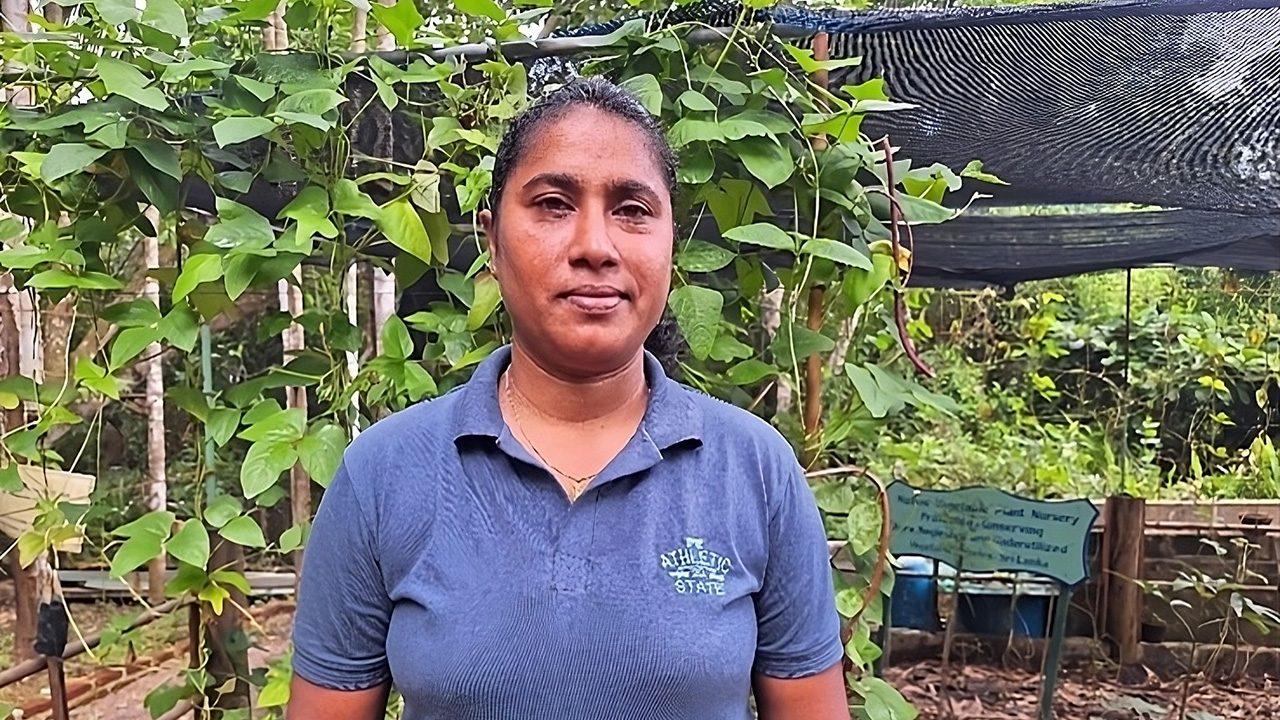Nestled in the lush Ambalangoda region of Sri Lanka, Madampa Lake is a vibrant ecosystem rich in biodiversity. This serene lake is surrounded by a network of wetlands and forests, supporting an array of flora and fauna. However, like many freshwater ecosystems, it faces threats from unsustainable agricultural practices and chemical runoff. Recognizing the importance of preserving this vital natural resource, the Nagenahiru Foundation has introduced the Family Farm Initiative as part of the Living Lakes Biodiversity & Climate Project (LLBCP).
This initiative is designed to conserve lake biodiversity while empowering women in local communities. By supporting women in managing family farms, the project also addresses gender equality issues in Sri Lankan society. Central to this effort is the promotion of organic fertilizers and traditional farming practices, aimed at enhancing lake biodiversity and fostering sustainable agriculture.
At the heart of this inspiring initiative is Disna Priyangani, a passionate Women’s Community Coordinator who has been instrumental in empowering women in the Madampa Lake region. Through her leadership, the project supports women from low-income families in building sustainable home garden farms, fostering both community resilience and environmental conservation.

Q: Introduce yourself and delineate your connection to the Women-based Agriculture Initiatives at Madampa Lake Basin.
My name is Disna Priyangani, and I serve as the Women’s Community Coordinator for the Her Family Farm Initiative at the Nagenahiru Foundation. Since 2023, I have worked to develop and implement this project in Godahena Village, Ambalangoda, Sri Lanka.
The initiative started in 2023 with 25 women from low-income families in Godahena, with the goal of establishing home garden farms. We aim to provide these women with practical knowledge of sustainable farming practices, including the use of organic fertilizers and traditional insecticide production. These methods are designed to minimize reliance on chemical inputs, promoting healthier and more productive farming. My role involves planning and monitoring these home garden farms, offering guidance on farm maintenance, and introducing income-balancing methods to support the women in their dual roles as farmers and family caregivers.
Q: What are the social and economic benefits of this initiative?
The initiative empowers women by enabling them to generate income, which improves family living standards and alleviates poverty. This economic stability not only enhances gender equality within families and society but also contributes to global goals like the Sustainable Development Goal (SDG) of Zero Hunger. By increasing productivity in the healthy food sector, the project addresses hunger while fostering gender empowerment.
Additionally, children are actively involved in farming activities alongside their mothers. This engagement helps pass down organic farming practices and knowledge to the next generation, ensuring a sustainable future for agriculture and environmental conservation.

Q: How does this initiative contribute to protecting the lake, and what are the plans for its development?
This initiative plays a vital role in protecting Madampa Lake. Chemical fertilizers, when washed into the lake, pose a significant threat to its biodiversity. By transitioning to organic fertilizers, we not only reduce this threat but also rehabilitate soil damaged by chemicals, improving its microhabitats and overall health.
Looking ahead, we plan to:
- Obtain organic farm certification under a unified brand, which will help market the products more effectively.
- Develop direct-to-customer sales strategies to eliminate middlemen, thereby increasing income for the women farmers.
- Enhance biodiversity by planting native butterfly-attracting and host plants. These plants will naturally boost productivity in the home gardens by supporting pollination and creating a thriving ecosystem.
The Family Farm Initiative at Madampa Lake embodies the spirit of community-driven conservation and sustainable development. By empowering women and promoting eco-friendly agricultural practices, this project not only protects the biodiversity of Madampa Lake but also uplifts the social and economic well-being of local families.
As a proud initiative under the Living Lakes Biodiversity & Climate Project (LLBCP), this work reflects the broader mission of the Living Lakes Network: to protect, restore, and sustainably manage freshwater ecosystems worldwide. The collaboration and shared vision across Living Lakes partners underscore the importance of collective action in addressing global environmental challenges.
The success of this initiative serves as a powerful example of how local actions, supported by global networks like Living Lakes, can create meaningful and lasting impacts. Together, we continue to work toward a future where lakes, wetlands, and communities thrive in harmony.

